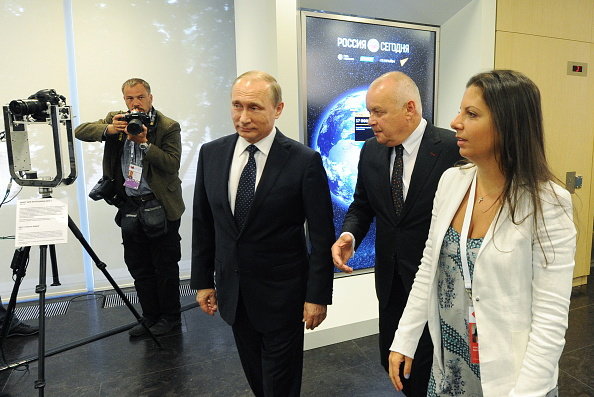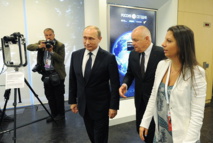The Russians are accused of hacking the email systems of the Democratic National Committee and conducting a widespread disinformation campaign that included the propagation of fake news stories on the internet and the airwaves.
RT’s coverage of Hillary Clinton “throughout the U.S. presidential campaign was consistently negative and focused on her leaked emails and accused her of corruption, poor physical and mental health and ties to Islamic extremism,” the declassified intelligence report said.
What is RT?
RT, formerly called Russia Today, was founded in 2005 as part of the state-owned news agency RIA Novosti. The network describes itself on its website as the first “Russian 24/7 English-language news channel which brings the Russian view on global news.” President Vladimir V. Putin of Russia said the network was created to “break the Anglo-Saxon monopoly on the global
Though the network is owned and operated by the Russian government, its executives say their journalists are independent. One anchor, however, quit her job during a live broacast in 2014, after saying she could no longer work for a network that “whitewashes the actions of Putin.”
In the United States, RT America is broadcast by cable companies in some cities, is carried by Dish, the satellite television provider, and can be found free online. Larry King, the former CNN host, and Ed Schultz, a former MSNBC host, both have programs on the network.
Did RT influence the American election?
The role of RT in the Kremlin’s effort to influence the election is covered in more detail than any other part of Russia’s campaign in the report, released by the Office of the Director of National Intelligence on Friday.
According to the report, the network aggressively uses the internet and social media to conduct “strategic messaging for the Russian government.” RT videos receive more than one million views a day on YouTube, according to the report, and the network’s programming was “aimed at undermining viewers’ trust of US democratic procedures.
The report’s assessment of RT is an awkward development for Lt. Gen. Michael T. Flynn, Mr. Trump’s nominee for national security adviser. General Flynn has appeared repeatedly on RT’s news programs, and in December 2015 the network paid him to give a speech in Russia and attend a lavish anniversary party, where he sat next to Mr. Putin. General Flynn has since defended that speech, insisting that RT is no different from CNN or MSNBC.
Mr. Trump also appeared on Mr. King’s program, “Politicking,” during the campaign.
On Friday, Margarita Simonyan, the editor in chief of RT, posted a message to Twitter that mocked the American report.
“Aaa, the C.I.A. report is out!” she wrote. “Laughter of the year! Intro to my show from 6 years ago is the main evidence of Russia’s influence at US elections. This is not a joke!”
Has RT been accused of disinformation before?
Analysts say Russia lacks the economic and military power to combat NATO, the European Union or the United States directly. The country has instead invested in “weaponized” information, using hacking, propaganda and other means to sow doubt and division in other countries. The goal is to weaken cohesion among Western allies, stir discord in their domestic politics and blunt opposition to Russia.
Last year, Swedish authorities said they traced to Russia a disinformation campaign when Sweden was considering cooperating militarily with NATO.
Russian intelligence agents used a variety of means to spread misinformation. “We mean everything from internet trolls to propaganda and misinformation spread by media companies like RT and Sputnik,” Wilhelm Unge, a spokesman for the Swedish Security Service, said during a speech to that agency last year.
In 2014, Russian news media produced multiple theories about the destruction of Malaysia Airlines F light 17 over Ukraine, blaming the C.I.A. and Ukrainian fighter pilots who had mistaken the airliner for the Russian presidential aircraft. Separate Dutch and Ukranian inquiries concluded that Russian-backed insurgents had accidentally shot down the plane with a missile they got from Russia.
That same year, an RT America anchor quit during a live broadcast to protest the network’s coverage of Russia’s invasion and occupation of Crimea. “Personally, I cannot be part of a network funded by the Russian government which whitewashes the actions of Putin,” said Liz Wahl. Another anchor, Abby Martin quit some months after denouncing Russia’s incursion on air. “What Russia did was wrong,” Ms. Martin said.
It is not clear how many people RT and Sputnik reach. The numbers released by the Broadcasters’ Audience Research Board in Britain for the week of the “Brexit” vote in late June, a week of particularly heavy TV watching nationwide, for example, showed it had 926,000 viewers, or 1.57 percent of the audience.
--------------------
The New York Times









 Home
Home Politics
Politics











